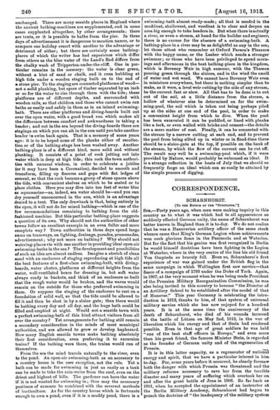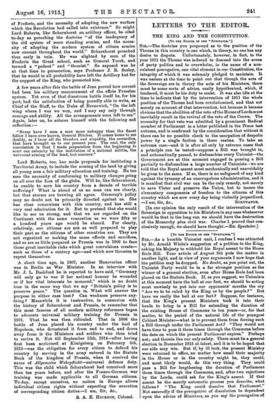CORRESPONDENCE.
SCHARNHORST.
[TO THE EDITOR OF THE "SPECTATOR...1
Sin,—Forty years ago, when men were making inquiry in this country as to what it was which had to all appearances so suddenly effected German unity, the name of Scharnhorst was better known in England than it is to-day. We do not realize that he was a Hanoverian artillery officer of the same stock whence came that King's German Legion whose achievements won such glorious fame in the Peninsula and at Waterloo. But for the fact that his genius was first recognized in Berlin he would himself doubtless have been fighting in the Legion at Waterloo, where in the very centre of the line his old friend Von Ompteda so bravely fell. Even so, Scharnborst's first experience of war was gained under the British flag in the same campaign in which Wellington first saw service—that fiasco of a campaign of 1793 under the Duke of York. Again, in 1807, at the very moment when he was being made President of the Prussian Military Reorganization Commission, he was also being invited to this country to become " the Director of an Artillery School to be established after the model of that of Hanover." This year Germany is celebrating the intro- duction in 1813, thanks to him, of that system of universal military service which she has now enjoyed for a hundred years. It is at the same time the anniversary of the death of Scharnhorst, who died of his wounds incurred at the battle of Liitzen on May 2nd, 1813, in the war of liberation which his energy and that of Stein had rendered possible. Even in that age of great soldiers he was held " one of the best staff officers in Europe," and even more than his great friend, the famous Minister Stein, is regarded as the founder of German unity and of the regeneration of Prussia.
It is in this latter capacity, as a regenerator of natio-n.71 energy and spirit, that we have a particular interest in him to-day. For, some years before it occurred, he clearly foresaw both the danger with which Prussia was threatened and the military reforms necessary to save her from the terrible disaster and many years of suffering which overtook her on and after the great battle of Jena in 1806. So far back as 1801, when be accepted the appointment of an instructor at the Berlin Military Academy, Scharnhorst had begun to preach the doctrine of " the inadequacy of the military system
of Frederic, and the necessity of adopting the new warfare which the Revolution had called into existence." So might Lord Roberts, like Scharnhorst an artillery officer, be cited to-day as preaching the doctrine " of the inadequacy of the old system of mere standing armies, and the neces- sity of adopting the modern system of citizen armies now current throughout the world." Scharnhorst preached thus early in vain. He was slighted by men of the Frederic the Great school, such as General Yorck, and termed a "pedant" and " theorist." So exposed was he at that time to persecution, says Professor J. R. Seeley, that he would in all probability have left the Artillery but for the support of the King, who promoted him.
A few years after this the battle of Jena proved how correct bad been his military measurement of the effete Prussian system. Yet even of that disastrous battle itself he, for his part, had the satisfaction of being proudly able to write, as Chief of the Staff, to the Duke of Brunswick, "On the left wing where I was we won, and I may say only through
courage and ability. All the arrangements were left to me." Again, later on, he solaces himself with the following sad reflection:— "Never have I seen a man more unhappy than the finest fellow I have ever known, General Blucher. It comes home to me doubly, as I know all the blunders and stupidity, the cowardice, that have brought us to our present pass. The real, the only consolation is that I made preparation from the beginning to avert our calamity by the institution of a national militia, the universal arming of the land, last summer."
Lord Roberts, too, has made proposals for instituting a Territorial Army, to include the arming of the land by giving all young men a fair military education and training. He too sees the necessity of conforming to military changes going on all over the face of the globe. Will he, like Scharnhorst,
be unable to save his country from a decade of terrible suffering P What is ahead of us no man can see clearly, but that storms are brewing all agree. Germany's policy may no doubt not be primarily directed against us. She has close connexions with this country, and has still a very real admiration for it. But to pretend that she would like to see us strong, and that we are regarded on the Continent with the same veneration as we were fifty or a hundred years ago would be absurd. For clearly, relatively, our citizens are not as well prepared to play their part as the citizens of other countries are. They are not organized or making the same efforts and sacrifices, and so are as little prepared as Prussia was in 1806 to face those great inevitable risks which great convulsions create— such as those of a century ago—and which now threaten to repeat themselves.
A short time ago, in 1907, another Hanoverian officer was in Berlin as War Minister. In an interview with Mr. J. L. Bashford he is reported to have said, " Germany will only go to war if her national honour be wounded or if her vital interests be menaced," which is no doubt true in the same way that we say "Britain's policy is to preserve peace." The question is, What will answer the purpose in either case best ? Can weakness preserve any- thing ? Meanwhile it is instructive, in connexion with the history of Scharnhorst and Prussia, to remember that this most famous of all modern military reformers began to advocate universal military training for Prussia in 1801. That he was then ridiculed. That in 1806 the battle of Jena placed his country under the heel of Napoleon, who devastated it from end to end, and drove away from it the Ministers and soldiers who then tried to revive it. Not till September 13th, 1814—after having first been acclaimed at Konigsberg on February 5th, 1813—was the obligation for every citizen to defend his country by serving in the army entered in the Statute Book of the kingdom of Prussia, when it received the name of dillgemeine Wehrpflicht—universal defence duty. This was the child which Scharnhorst had conceived more than ten years before, and after the Franco-German war training was made applicable to all German citizens.
To-day, except ourselves, no nation in Europe allows individual citizen rights without expecting the execution of corresponding citizen duties.—I am, Sir, &c.,
S. A. E. HICKSON, Colonel.



































 Previous page
Previous page